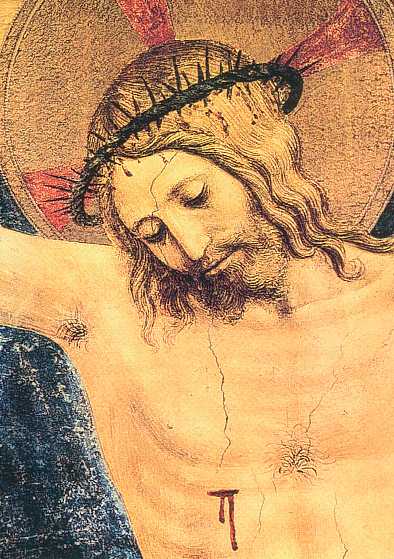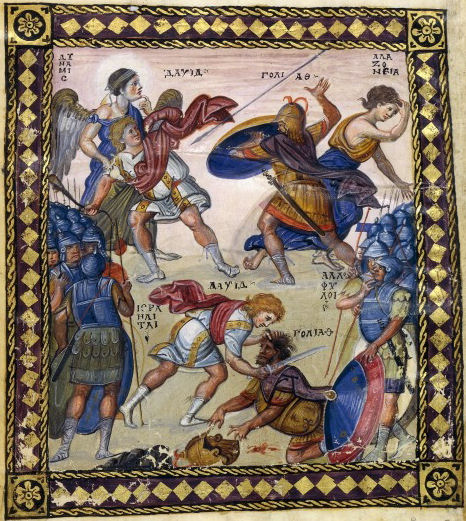
Psalm 17/1: Diligam
te Domine
Vulgate
|
Douay-Rheims
|
In finem. Puero Domini David, qui locutus est Domino verba
cantici hujus, in die qua eripuit eum Dominus de manu omnium inimicorum ejus,
et de manu Saul, et dixit:
|
Unto the end, for David, the servant of the Lord, who
spoke to the Lord the words of this canticle, in the day that the Lord
delivered him from the hand of all his enemies, and from the hand of Saul:
and he said
|
Díligam te, Dómine, fortitúdo mea: * Dóminus firmaméntum
meum, et refúgium meum, et liberátor meus.
|
I will love you, O Lord, my strength: The Lord is my firmament,
my refuge, and my deliverer.
|
2 Deus meus adjútor meus, * et sperábo in eum.
|
My God is my helper, and in him
will I put my trust.
|
3 Protéctor meus, et cornu salútis meæ, * et
suscéptor meus.
|
My protector, and the horn of my salvation,
and my support.
|
4 Laudans invocábo Dóminum: * et ab
inimícis meis salvus ero.
|
Praising, I will call upon the Lord:
and I shall be saved from my enemies.
|
5 Circumdedérunt me dolóres mortis: * et
torréntes iniquitátis conturbavérunt me.
|
The sorrows of death surrounded
me: and the torrents of iniquity troubled me.
|
6 Dolóres inférni circumdedérunt me: *
præoccupavérunt me láquei mortis.
|
The sorrows of hell encompassed me: and the snares of
death prevented me
|
7 In tribulatióne mea invocávi Dóminum,
* et ad Deum meum clamávi.
|
In my affliction I called upon
the Lord, and I cried to my God:
|
8 Et exaudívit de
templo sancto suo vocem meam: * et clamor meus in conspéctu ejus, introívit
in aures ejus.
|
And he heard my voice from his holy
temple: and my cry before him came into his ears.
|
9 Commóta est, et contrémuit terra: *
fundaménta móntium conturbáta sunt, et commóta sunt, quóniam irátus est eis.
|
The earth shook and trembled: the foundations of the
mountains were troubled and were moved, because he was angry with them.
|
10 Ascéndit fumus in ira ejus: et ignis
a fácie ejus exársit: * carbónes succénsi sunt ab eo.
|
There went up a smoke in his wrath:
and a fire flamed from his face: coals were kindled by it.
|
11 Inclinávit cælos, et descéndit: * et
calígo sub pédibus ejus.
|
He bowed the heavens, and came
down, and darkness was under his feet.
|
12 Et ascéndit super Chérubim, et
volávit: * volávit super pennas ventórum.
|
And he ascended upon the cherubim,
and he flew; he flew upon the wings of the winds.
|
13 Et pósuit ténebras latíbulum suum, in
circúitu ejus tabernáculum ejus: * tenebrósa aqua in núbibus áëris.
|
And he made darkness his covert, his pavilion round about
him: dark waters in the clouds of the air.
|
14 Præ fulgóre in conspéctu ejus nubes
transiérunt, * grando et carbónes ignis.
|
At the brightness that was before him the clouds passed,
hail and coals of fire.
|
15 Et intónuit de cælo Dóminus, et
Altíssimus dedit vocem suam: * grando et carbónes ignis.
|
And the Lord thundered from heaven,
and the Highest gave his voice: hail and coals of fire.
|
16 Et misit sagíttas suas, et dissipávit
eos: * fúlgura multiplicávit, et conturbávit eos.
|
And he sent forth his arrows, and he scattered them: he
multiplied lightnings, and troubled them
|
17 Et apparuérunt fontes aquárum, * et
reveláta sunt fundaménta orbis terrárum:
|
Then the fountains of waters
appeared, and the foundations of the world were discovered:
|
18 Ab increpatióne
tua, Dómine, * ab inspiratióne spíritus iræ tuæ.
|
At your rebuke, O Lord, at the blast of the spirit of your
wrath.
|
19 Misit de summo, et accépit me: * et
assúmpsit me de aquis multis.
|
He sent from on high, and took
me: and received me out of many waters.
|
20 Erípuit me de inimícis meis
fortíssimis, et ab his qui odérunt me: * quóniam confortáti sunt super me.
|
He delivered me from my strongest
enemies, and from them that hated me: for they were too strong for me.
|
21 Prævenérunt me in die afflictiónis
meæ: * et factus est Dóminus protéctor meus.
|
They prevented me in the day of my
affliction: and the Lord became my protector.
|
22 Et edúxit me in latitúdinem: * salvum
me fecit, quóniam vóluit me.
|
And he brought me forth into a
large place: he saved me, because he was well pleased with me.
|
23 Et retríbuet mihi Dóminus secúndum justítiam meam: * et
secúndum puritátem mánuum meárum retríbuet mihi :
|
And the Lord will reward me
according to my justice; and will repay me according to the cleanness of my
hands:
|
24 Quia
custodívi vias Dómini, * nec ímpie gessi a Deo meo.
|
Because I have kept the ways of
the Lord; and have not done wickedly against my God.
|
25 Quóniam ómnia judícia ejus in conspéctu meo: * et justítias
ejus non répuli a me.
|
For all his judgments are in my
sight: and his justices I have not put away from me.
|
26 Et ero immaculátus cum eo: * et
observábo ab iniquitáte mea.
|
And I shall be spotless with him:
and shall keep myself from my iniquity.
|
27 Et retríbuet mihi
Dóminus secúndum justítiam meam: * et secúndum puritátem mánuum meárum in
conspéctu oculórum ejus.
|
And the Lord will reward me
according to my justice: and according to the cleanness of my hands before
his eyes.
|
The sheer length of this
psalm might appear sufficient in itself to explain why St Benedict splits it between Saturday and
Sunday.
There is though, an important thematic
reason for this as well: the first half of this psalm is very much a psalm of Good
Friday, for it can be read as describing the events from Christ’s trial, to the
earthquake at his death and descent into hell.
Today’s section of the psalm focuses
on the idea, following on directly from the previous psalm, that God has heard
the psalmist’s prayer because he is blameless – as Christ became the perfect
sacrifice for our sins.
And the centrepiece of this part of
the psalm is a dramatic theophany, a storm that shakes the earth with God’s
anger, echoing the ‘terra tremuit’ verse in Psalm 75 at Lauds for Friday, and
serving as a reminder of the earthquake that split the Temple in two at the
moment of Our Lord’s death.
St Augustine:
That is, for the strong of hand, Christ in His Manhood. The words of this song which he spoke to the Lord on the day when the Lord delivered him out of the hands of his enemies, and of the hand of Saul; and he said, On the day when the Lord delivered him out of the hands of his enemies and of the hand of Saul: namely, the king of the Jews, whom they had demanded for themselves. For as David is said to be by interpretation, strong of hand; so Saul is said to be demanding. Now it is well known, how that People demanded for themselves a king, and received him for their king, not according to the will of God, but according to their own will.St Thomas Aquinas:
In the preceding psalm, the psalmist sought in prayer to be liberated from his enemies; here he has been liberated and is giving thanks. And first he gives thanks for the benefit of liberation. Second, he burst into praise of the liberator, where he says, "The heavens tell the glory of God. The title. To the end, for the boy of the Lord, David. And he spoke the words of this song on the day when the Lord rescued him from the hands of his enemies, and from the hand of Saul. And this psalm, word for word, is to be found in 2 Kings 22. The story is, as in 1 Kings 19, how Saul sought to kill him: and when Saul had died, 2 Kings 2: Again Abner and his son were against him In the end David was victorious over them. And on this account he made this psalm. And since Christ is signified by David, all these things can be referred to Christ, either according to the head, or according to the body, namely the Church, which is liberated from Saul, that is, from death: the name "Saul" is translated as "petition", because he was given, or rather extorted (from God) because the people asked for him, and he was not given so that he would remain for any length of time. Thus Christ first bore death, then there was a time of quiet, according to the gloss. He was also liberated from all his enemies, the Jews and demons, and with respect to his body, that is, the Church. In the first part he recalls the benefit of liberation in general terms.St Alphonse Liguori:
David gives thanks to God for having delivered him from the hands of his enemies, and especially from the hands of Saul. This psalm is applicable to the Christian soul that sees itself delivered, with God s help, from every grave persecution or every temptation of the devil.Fr Pasch
David's hymn of thanks and victory: At the end of his life, David sings this Psalm as a sort of swan song, one of the most beautiful compositions in the Psalter. He looks back over the battles of his life and his final victory over all his enemies―a note of courage for the coming conflicts of the week. God's Kingdom, too, must battle in Church and soul―but under God's sure guidance, it will be victorious. Note particularly the magnificent description of God's apparition, in the figure of a thunder storm.
Liturgical and Scriptural uses of the psalm
|
NT
references
|
Lk 1:69 (vs 3); Lk 1:71
(20)
|
|
RB
cursus
|
Friday Prime
|
|
Monastic/(Roman)
feasts etc
|
-
|
|
Roman
pre 1911
|
Sunday Matins
|
|
Roman
post 1911
|
1911-62:
Monday Matins . 1970:
|
|
Mass
propers (EF)
|
Passion Wed IN (1-2);
Pentecost Monday, IN (14-16),
PP2 IN (2, 3, 14, 20);
PP4 CO (3);
|
